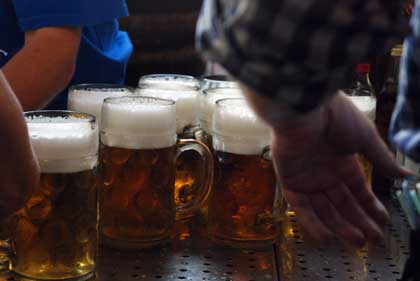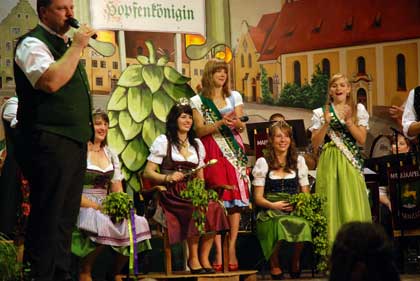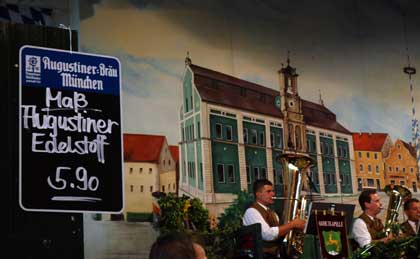Did I mention the Edelstoff from Augustiner was from the wood, and a lot cheaper than beer at Oktoberfest in Munich?

Last week Veronika Springer was crowned Hallertau Hop Queen (Hopfenkönigin) for 2011-2012. I didn’t vote for her, but she received 62 percent (1,478) of the votes. The Wolnzach Volkfest tent was rocking, packed with hop farmers and friends washing down traditional festival food with liters of Augustiner.

The new queen is well qualified, having grown up on a hop farm and currently working at NATECO2, an extraction plant where hops are the biggest part of the business. She didn’t get my support, or that of several of the brewmasters I was seated with, because she seems to be skeptical about the future of “flavor”1 hops.
Change is afoot in Germany and these are brewers who want to be part of it. That doesn’t mean they are about to abandon tradition, but it does mean the range of flavors from Halltertau hops will soon be broader.2 The crew at the Hop Research Center at Hüll is not interested in copying American hop flavors, but I was there maybe three minutes before I thought, “These guys are not going to be left behind.”
1 With the line between what were once known as “bittering” and “aroma” hops already blurred — and the term “dual purpose” just not cutting it — I’m not sure how the idea of “flavor hops” will fit in, but I heard those words in the UK, Germany and Czech Republic. These could also be called “impact hops.” To the continental palate Cascade is a “flavor” hop; while you’ve got to throw something like Citra or Simcoe at an hop-experienced American for impact. Sound confusing? At least you don’t have to sort it out for a book.
2 These hops are also going to show up in beers brewed in America. I can’t wait.

Okay, now you’re just being mean.
>snif< Man, I really miss that culture.
I was lucky enough to drink Augustiner Helles from wooden casks at the Keller on my last trip to Munich, very nice stuff.
Uh — 5.90 a liter? I know that's Euros, and I couldn't say how that would translate to Marks on my last visit to Bavaria, but that sure sounds (respectably) cheap.
I firmly expect that German brewers will show the nouveau American beer chauvinists a thing or two in the next few years.
Flavour hops is a tricky one because the mainstream press has run a story (http://www.focus.de/wissen/wissenschafts-meldungen/bier-brauereien-gelingt-hopfen-anbau-mit-fruchtaroma_aid_649155.html) which completely misses the point and implies that they are some sort of trick to enable brewers to make orange and lemon-flavoured beer while still complying with the Purity Law.
Barm – Thanks for that link. I hadn’t seen it.
Should be interesting when the German mainstream press finds out about the chocolate flavored hops that have resulted from crossbreeding in Oregon.
Barm- an orange and lemon flavored beer is as simple as brewing a beer that complies with the Purity Law and you used a Humulus lupulus var. neomexicanus variety hops. It’s very simple. Use the right hop. North American noble/aromatic hops. No tricks,, real hops.
I seem to be missing something here. If Germans want a lemon-flavoured beer, they squeeze the juice of a lemon into it. They’ve been flavouring beers that way there for years. My parents used to drink Berliner Weisse as kids in Berlin (in the 1930s) with syrup in it.
Chocolate-flavoured Edelstoff? Fruit-flavoured Kellerbier? I think someone is having you on.
Mike – I don’t think anybody is talking about messing with Edelstoff. But the researchers at Hüll are interested in providing growers and brewers with options. That doesn’t mean jettisoning other op varieties or perfectly good beer recipes.
And that “chocolate hop” would be years away from ending up in a beer, but is an indication you never know what might emerge through cross breeding.
Stan – if you were talking about theoretical experiments in a laboratory (ie, what is possible), then OK, fair enough. However, you prefaced these comments with “Change is afoot in Germany”, which makes it sound as if German beers will soon change.
Frankly, I’ve never met a German brewer who seemed upset that he couldn’t afford a Rolls Royce or a German beer drinker who couldn’t find anything enjoyable to drink. In fact, when I go to Bavaria in the summer or Nordrhein-Westfalen in the fall or winter, pubs are generally quite full. I’ve been to a non-tourist pub in Cologne in the spring and not been able to get a table at lunch time. How can you improve on that?
This strikes me as a solution in search of a problem.
Mike – The only way to find out what things will be like in 5 or 10 years is to wait 5 or 10 years. But brewers, and those who provide “tools” such as hops with different flavors/aromas, have noticed German beer consumption continues to shrink. People are choosing not to drink beer. They are choosing beers made with less hops. That’s not a problem if you are in the business?
Stan – I agree fully with your opening comment – just don’t say that to stock brokers as that seems to be how the earn (steal?) their money.
While it is true that German beer consumption “continues to shrink” that statement is also true of most beer drinking countries, including the US.
Germans are “choosing beers made with less hops”? That’s news to me. I’ve tasted plenty of hoppy beers in Bavaria and neither alt nor kölsch seem any less hoppy to me now than they were in the past.
Perhaps these hop people are looking more toward the export market.
Yes, less-hoppy beers are becoming more the norm in German brewing, especially if you consider the well-known names in Pils. Krombacher Pils is nearly unrecognizable compared to bygone hoppier days, and the likes Jever Pils and Flensburger Pils aren’t the hop-laden glories they used to be, either. That doesn’t mean they’re all dumbed-down though, and yes, a good Päffgen Kölsch or Uerige Alt still reminds you that hops are not entirely absent from 21st century German brewing culture. But the trend away from hops in German brewing is quite real.